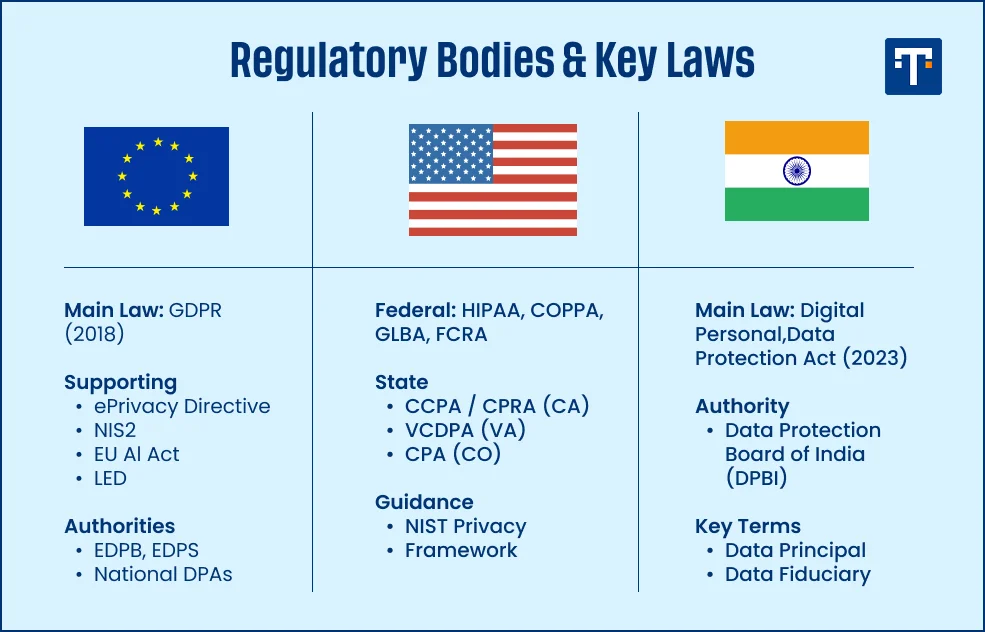Necessary Always Active
Necessary cookies are required to enable the basic features of this site, such as providing secure log-in or adjusting your consent preferences. These cookies do not store any personally identifiable data.
|
||||||
|
||||||
|
||||||
|

Global data privacy wars highlight the contrasting approaches of the United States, the European Union, and rapidly digitizing economies such as India in controlling and protecting personal data. Data is the foundation of innovation and economic growth in our digital world. However, misuse, unauthorized access, or cybersecurity breaches can weaken the public’s trust in any government or organization.
This is why the U.S., the EU, and India are continually updating their privacy frameworks. Each region has developed unique regulations with varying territorial reach. This article examines the existing data privacy laws in these regions, their global impact, and how they can build digital trust across borders.
The EU data privacy law mainly refers to the 2018 General Data Protection Regulation (GDPR). The policy has achieved global compliance standards, largely due to its extraterritorial reach, which extends beyond Europe to every organization managing the personal data of EU residents.
Data protection as a fundamental right under the EU Charter of Fundamental Rights includes:

National supervisory authorities across EU member states enforce compliance with GDPR. They include the European Data Protection Board (EDPB) and European Data Protection Supervisor (EDPS). The European Union also establishes National Data Protection Authorities (DPAs) for each member country.
Complementary Regulations and Frameworks to GDPR
Unlike the European data privacy law, the United States does not have a single, comprehensive federal framework. The U.S. data privacy laws are rather a patchwork of sector-specific federal laws and state-level regulations.
The many federal laws without a comprehensive policy have led to individual states passing their own legislation for data privacy. California is the first state to set its data privacy regulations, which include:
Some states have followed with similar measures, such as the Virginia Consumer Data Protection Act (VCDPA) and the Colorado Privacy Act (CPA).
India has undergone one of the fastest digital transformations in the world, with internet penetration now reaching 55.3% of the over 1.4 billion population. This surge in online activity created the urgent need for a modern data privacy law, which led to the Digital Personal Data Protection Act (DPDP Act) in 2023.
India’s data privacy law, through the DPDP, defines two central roles. We have a) the Data Principal or individual whose personal data is collected, and b) the Data Fiduciary or the entity responsible for processing that data.
Similar to the European data privacy law, rights of Data Principals include:
Certain “legitimate uses,” such as employment-related processing or government functions, may not require explicit consent. On cross-border transfers, the DPDP Act allows the Indian government to restrict transfers to specific jurisdictions. This gives the country more direct control over international data flows.
The Act establishes the Data Protection Board of India (DPBI) as the authority responsible for investigating compliance and imposing financial penalties for violations.
The global data privacy wars focus on balancing consent, accountability, and individual data rights. These are the major comparison metrics for the U.S., EU, and India data protection laws:
The European Union treats the privacy of personal data as a fundamental right through its main GDPR law. However, the United States has an innovative capitalist market structure that makes it view privacy as a consumer-protection and market-driven concern. India’s DPDP Act is a hybrid model because it grants individual rights while accommodating government and business needs.
GDPR, as the major European data privacy law, applies beyond the shores of the EU to any organization handling EU residents’ data. The United States has a more limited scope since it relies on a fragmented mix of sectoral federal laws and state-specific policies. However, India’s data privacy law is broad, but mainly regional, so its international effectiveness is yet to be confirmed.
The European Union is leading the global data privacy wars by setting the standard across its large, lucrative market. Tech giants like Microsoft, Apple, and Meta have adopted GDPR to maintain access to their EU customers. Compared to U.S. and Indian data privacy frameworks, the EU’s rules are game-changing for B2B leaders. We now have many non-EU firms that set their own internal compliance standards to mirror the GDPR to avoid being shut out of EU trade.
The global data privacy wars are less about declaring a single winner and more about building a digital ecosystem that people can trust. The EU’s GDPR remains a global reference point, inspiring privacy laws across regions and industries.
As technologies such as AI and machine learning, decentralized finance, and cross-border data flows continue to advance, the urgency to close regulatory gaps grows stronger. The future of digital trust will not be shaped by one region alone, but through cooperative action by governments worldwide. Success will depend on whether nations can align around shared principles of transparency, accountability, and individual rights.
Sign up to receive our newsletter featuring the latest tech trends, in-depth articles, and exclusive insights. Stay ahead of the curve!